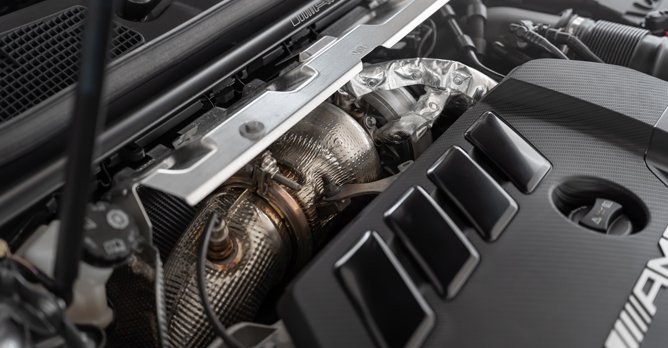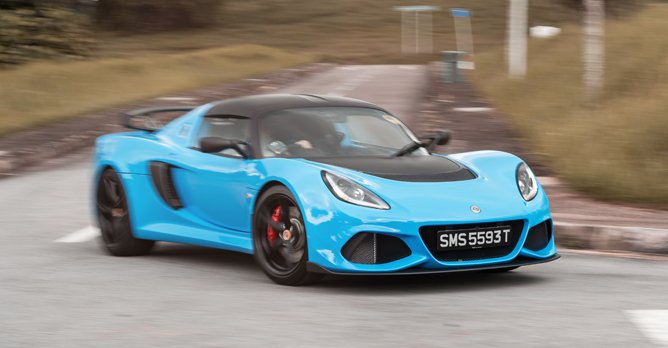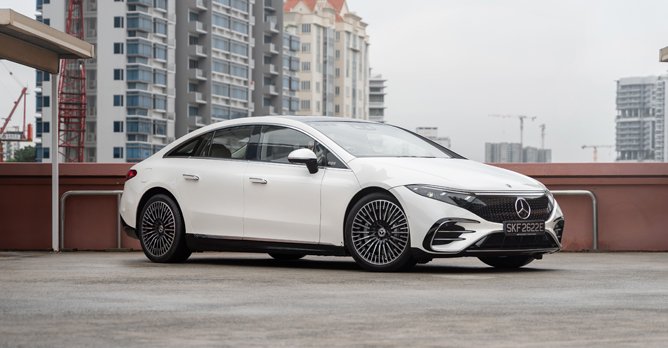Mythbusted: Does a faster car always consume more fuel?
29 Dec 2022|14,344 views
Internal combustion engines ignite fuel to produce power, with a larger amount of fuel used, a larger explosion occurs, resulting in even more power produced. That's why engines with a larger capacity tend to make more power, leading to the often coined phrase - "there's no replacement for displacement".
Hence, in order to attain the additional power required to go fast, you'll naturally end up with an engine that burns more fuel. But is combusting obscene amounts of fuel the only way to go fast? Let's find out.
Technology to increase performance often helps with fuel economy as well
The use of modern technology has allowed powerful engines to be created. Just look at the 2.0-litre turbocharged engine that is found in the A45 S and CLA45 S - with just 2.0-litre, it manages more than 400bhp, that's more than what much larger engines were able to push out in the past. And many times, these same technological advancements can be harnessed to result in an improved fuel economy.
Technology such as Honda's VTEC that many enthusiasts love does its magic by allowing an engine to switch between a milder and harsher (performance-oriented) set of camshaft profiles as it gets into the higher RPMs.
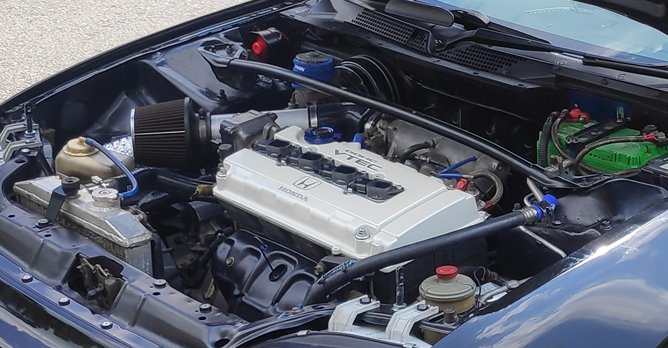
Forced induction is yet another popular technology to squeeze much more power from an engine. It also results in an engine that is able to operate with a higher level of fuel efficiency when desired (off-boost), and also able to give you all the power when you need it.
Then there's direct fuel injection, which allows engines to have extremely high compression ratios. A high compression engine squeezes the fuel and air mix within the cylinder to a greater extent.
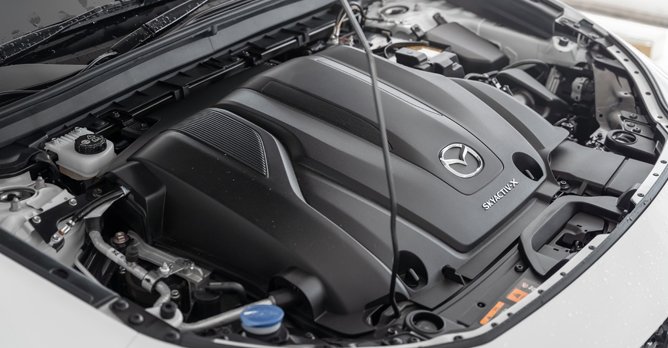
Hybrid systems that combine an electric motor to aid with the propulsion of the car can also result in increased performance with lesser impact on the car's efficiency as well. Thanks to all these technology, modern engines are able to make much more power, allowing cars to go way faster, all while consuming lesser fuel than cars from ages ago.
That said, in order to go really fast, you'll have to push hard on the pedal, and any engine will consume more fuel when you do so...
Less energy is required to move a lighter object
While power is important, it isn't all you need to go fast. Just look towards the direction of race cars and you'll quickly notice how most of them are stripped off of unimportant components for weight saving purposes.
To go fast, you will want to reduce the baggage that the engine has to shoulder - the car's weight. By making a car lighter, there's lesser inertia, which results in quicker acceleration, shorter stopping distance and it would even make it easier to get the car around turns.
That's why you'll notice performance car brands such as Lotus, who tries to make its cars as light as possible. With less weight to lug around, fuel economy will improve. This very reason is also why SUVs and other large, heavy cars tend to guzzle more fuel than their lighter counterparts. So, if you want to go faster while saving fuel, just find some way to make your car lighter!
Aerodynamics plays a huge part in going fast
Do you remember the era of wedge-shaped, door-stopper looking supercars like the Ferrari Testarossa, Lamborghini Diablo and others?
Engineers have long been battling against the air in order to create faster cars.
In more recent times, with wind-tunnel testing and intrinsic knowledge on the topic of aerodynamics, new cars are able to be designed to cut through air effortlessly.
As a result of cutting-edge aerodynamics, less energy is wasted to overcome air resistance. This allows a car to reach higher speeds with less effort (engine power). And with less effort required, the engine will naturally use less fuel.
While electric cars do not use petrol, they are fighting the same battle in order to achieve a better range. Hence, electric cars are often designed with low drag coefficient in mind, in order to achieve better range and efficiency.
Does this mean that fast cars can be even more fuel efficient than slower ones?
Right, engine technology, lightweight materials and slippery aerodynamics benefits both speed and efficiency. A well-designed car and engine can result in some fuel savings. However, at the end of the day, there still has to be a trade-off. And cars that are geared towards performance often forsake some efficiency to get there.
Fuel economy will to a large extent, depend on how the car is being driven as well. Drive an efficient car at its limits and you'll likely get a poor fuel economy. Likewise, driving a powerful car gently can also result in decent fuel consumption. That said, one thing is for sure, technology has allowed modern engines to be much more efficient and powerful as opposed to the engines of the yesteryears.
So does a faster car always consume more fuel? Well, a CLA45 S sure is faster than a Ferrari F355, but according to a quick search, the former's fuel economy is almost twice as good as the latter.
Here are some other articles that you might be interested in:
Mythbusted: Is high mileage always a con when it comes to buying used cars?
Mythbusted: Is a smaller engine always more fuel efficient?
Year of the rabbit (2023) - 10 affordable cars to hop into
Five sure-fire ways to improve your defensive driving skills
Never commit these acts of road rage while driving, no matter how angry you are

Sgcarmart
Latest New Car Discounts & Offers
We bring you the latest new car prices, discounts & offers direct from the car showrooms
Find a Number PlateInternal combustion engines ignite fuel to produce power, with a larger amount of fuel used, a larger explosion occurs, resulting in even more power produced. That's why engines with a larger capacity tend to make more power, leading to the often coined phrase - "there's no replacement for displacement".
Hence, in order to attain the additional power required to go fast, you'll naturally end up with an engine that burns more fuel. But is combusting obscene amounts of fuel the only way to go fast? Let's find out.
Technology to increase performance often helps with fuel economy as well
The use of modern technology has allowed powerful engines to be created. Just look at the 2.0-litre turbocharged engine that is found in the A45 S and CLA45 S - with just 2.0-litre, it manages more than 400bhp, that's more than what much larger engines were able to push out in the past. And many times, these same technological advancements can be harnessed to result in an improved fuel economy.
Technology such as Honda's VTEC that many enthusiasts love does its magic by allowing an engine to switch between a milder and harsher (performance-oriented) set of camshaft profiles as it gets into the higher RPMs.

Forced induction is yet another popular technology to squeeze much more power from an engine. It also results in an engine that is able to operate with a higher level of fuel efficiency when desired (off-boost), and also able to give you all the power when you need it.
Then there's direct fuel injection, which allows engines to have extremely high compression ratios. A high compression engine squeezes the fuel and air mix within the cylinder to a greater extent.

Hybrid systems that combine an electric motor to aid with the propulsion of the car can also result in increased performance with lesser impact on the car's efficiency as well. Thanks to all these technology, modern engines are able to make much more power, allowing cars to go way faster, all while consuming lesser fuel than cars from ages ago.
That said, in order to go really fast, you'll have to push hard on the pedal, and any engine will consume more fuel when you do so...
Less energy is required to move a lighter object
While power is important, it isn't all you need to go fast. Just look towards the direction of race cars and you'll quickly notice how most of them are stripped off of unimportant components for weight saving purposes.
To go fast, you will want to reduce the baggage that the engine has to shoulder - the car's weight. By making a car lighter, there's lesser inertia, which results in quicker acceleration, shorter stopping distance and it would even make it easier to get the car around turns.
That's why you'll notice performance car brands such as Lotus, who tries to make its cars as light as possible. With less weight to lug around, fuel economy will improve. This very reason is also why SUVs and other large, heavy cars tend to guzzle more fuel than their lighter counterparts. So, if you want to go faster while saving fuel, just find some way to make your car lighter!
Aerodynamics plays a huge part in going fast
Do you remember the era of wedge-shaped, door-stopper looking supercars like the Ferrari Testarossa, Lamborghini Diablo and others?
Engineers have long been battling against the air in order to create faster cars.
In more recent times, with wind-tunnel testing and intrinsic knowledge on the topic of aerodynamics, new cars are able to be designed to cut through air effortlessly.
As a result of cutting-edge aerodynamics, less energy is wasted to overcome air resistance. This allows a car to reach higher speeds with less effort (engine power). And with less effort required, the engine will naturally use less fuel.
While electric cars do not use petrol, they are fighting the same battle in order to achieve a better range. Hence, electric cars are often designed with low drag coefficient in mind, in order to achieve better range and efficiency.
Does this mean that fast cars can be even more fuel efficient than slower ones?
Right, engine technology, lightweight materials and slippery aerodynamics benefits both speed and efficiency. A well-designed car and engine can result in some fuel savings. However, at the end of the day, there still has to be a trade-off. And cars that are geared towards performance often forsake some efficiency to get there.
Fuel economy will to a large extent, depend on how the car is being driven as well. Drive an efficient car at its limits and you'll likely get a poor fuel economy. Likewise, driving a powerful car gently can also result in decent fuel consumption. That said, one thing is for sure, technology has allowed modern engines to be much more efficient and powerful as opposed to the engines of the yesteryears.
So does a faster car always consume more fuel? Well, a CLA45 S sure is faster than a Ferrari F355, but according to a quick search, the former's fuel economy is almost twice as good as the latter.
Here are some other articles that you might be interested in:
Mythbusted: Is high mileage always a con when it comes to buying used cars?
Mythbusted: Is a smaller engine always more fuel efficient?
Year of the rabbit (2023) - 10 affordable cars to hop into
Five sure-fire ways to improve your defensive driving skills
Never commit these acts of road rage while driving, no matter how angry you are

Sgcarmart
Latest New Car Discounts & Offers
We bring you the latest new car prices, discounts & offers direct from the car showrooms
Find a Number Plate







